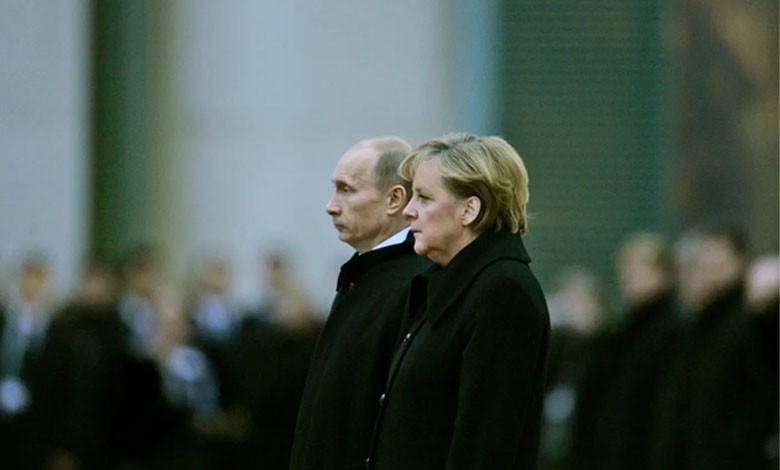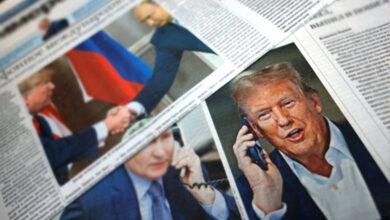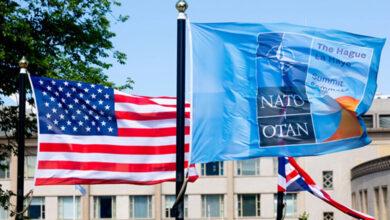How Merkel decided the fate of Ukraine and NATO: historical moments in the memoirs of the ex-chancellor

Angela Merkel, who led Germany for 16 years, for the first time shared her personal memories of the challenges in the position of chancellor. In his memoirs, excerpts from which were published in The time, she talked about difficult negotiations with world leaders, including Donald Trump and Vladimir Putin, landmark meetings with the then SPD Chancellor Gerhard Schroeder, the impact of her politics on current events in Ukraine. The book of memories is called “Freedom. Memories 1954 – 2021”, which is inconsistent with the rigid style of government that Germans associate with Merkel. However, the publishing house Kiepenheuer & Witsch expects that the ex-chancellor’s book will soon appear as a gift under every fourth Christmas tree.
While waiting for the publication of the full text, German publications have dissected Merkel’s memoirs for quotations. From them we can also learn about the role that Merkel played in the fate of Ukraine.
“Black chest” of the era
Politicians usually write memoirs to reveal a sort of “black box” of an era—a document that reveals hidden motives, explains difficult decisions, and reveals intentions that are not readily apparent to the public. This is an opportunity to tell your story, explain controversial points and demonstrate how the world appeared through the eyes of a memoirist. So a memoir is both a confession and a manifesto, and a way to continue influencing even after one’s career is over, because a politician’s actions often outlast their formal status. The German media half-jokingly called the memoir a means by which ex-chancellors can once again dictate the agenda in national and world politics.
“I realized that I was experiencing something exceptional”
In 2005, Angela Merkel came to power. The then chancellor Gerhard Schröder, who did not want to admit his defeat on TV after the elections to the Bundestag, predicted in a sharp way to the winner that his party would never support her as chancellor. “I sat there as if I was not a part of all this, as if I was watching the scene at home in front of the TV. She constantly repeated to herself: do not enter into arguments with others, otherwise you can resort to harsh words. It was quite clear to me that I was experiencing something special, although it was all quite unconscious. I doubted if Gerd Schroeder would do the same to a man“, — remembers Merkel, who remained chancellor for the next 16 years.
By the way, on her 70th birthday, Gerhard Schroeder paid tribute to her. “Among all political opponents, she is special. After all, she won“, he said in an interview with Stern magazine.
Troubled relationship with businessman Trump
Merkel recalls how she turned to the Pope for advice on how to communicate with Donald Trump after he was elected president of the United States. She really wanted to find a way to convince Trump not to withdraw from the Paris climate agreement. However, Trump, in her opinion, thought like a businessman, focused on winning or losing. Trump has repeatedly called global warming a “hoax” invented to undermine the competitiveness of American industry. In June 2017, Trump officially announced that the United States was withdrawing from the agreement, explaining that it was allegedly causing a lot of damage to the American economy and putting the country at a disadvantage compared to other countries.
Merkel, along with other world leaders including Emmanuel Macron and Justin Trudeau, tried to persuade Trump to reverse the decision, but their efforts were futile. The U.S. withdrawal from the accord was a major blow to global efforts to combat climate change, as the U.S. is one of the world’s biggest polluters. Under Biden’s presidency, America returned to membership in the Climate Agreement.
When Donald Trump became the US president in 2017, Angela Merkel was one of the oldest political leaders in the world and at the same time the most influential person in the EU. It played a key role in Germany’s and Europe’s response to the eurozone economic crisis, the COVID-19 pandemic and Russia’s 2014 annexation of Crimea. While many politicians around the world fretted over Trump’s victory, Merkel’s calm and decisiveness, as well as her emphasis on values such as freedom and human rights, earned her the title of “true leader of the free world,” a title usually given to the president of the United States.
In her book, written before Trump’s second victory, Merkel expressed her “deep hope” that Vice President Kamala Harris would defeat her rival.
Numerous meetings with Putin
Merkel is often described as a person who sees through Putin, because she has enough experience for that. And indeed, in the published parts of her memoirs, she talks about numerous meetings with Putin. “I perceived him as a person who did not want to be neglected and at the same time was ready to attack at any moment. Maybe you think it’s childish and silly, maybe you shake your head at it. But this means that Russia never disappeared from the map“, — notes ex-chancellor in her memoirs.
Putin, for in words Merkel always focused exclusively on the USA: one can say that he dreamed of the roles that the former Soviet Union and the USA played during the Cold War, during which they had the status of superpowers that were in a long confrontation.
Why did Merkel delay Ukraine’s accession to NATO?
In her memoirs, Merkel also explains why she hindered Ukraine’s advancement to NATO. “I understood the desire of the countries of Central and Eastern Europe to become NATO members as soon as possible, because they wanted to join the Western community after the end of the Cold War. There was no doubt that Russia could not give these countries what they sought: freedom, self-determination, prosperity”, — notes ex-chancellor.
At the same time, she believes, NATO and its member states should also assess the possible consequences of each step of enlargement, its impact on the alliance, its security, stability and ability to function. Acceptance of a new member should bring more security not only to it, but also to NATO.
Let’s recall the context. The then US President George W. Bush, ending his presidential term, sought to bring Ukraine and Georgia closer to NATO through the so-called “Membership Action Plan” with the clear goal of their joining the alliance. However, Merkel, together with then French President Nicolas Sarkozy, prevented this.
Edition Picture analyzes the biggest dilemma surrounding the Ukraine-NATO issue in order to find out whether Merkel’s approach at the time was strategically correct. According to her logic at the time, the actions of the collective West were not supposed to provoke Russian President Vladimir Putin. “I considered it grossly negligent to discuss the membership status of Ukraine and Georgia without analyzing Putin’s vision“, — quotes publication of Merkel’s memoirs. Of course, adds Bild, the calculation did not work: Putin became more and more unhinged over the years, and in 2014 Russia annexed Crimea, violating international law.
Merkel was also convinced that giving Ukraine the prospect of NATO membership could lead to problems with Russia due to the location of its Black Sea Fleet in the Crimean peninsula. This would create a situation where Ukraine’s growing integration into NATO could intersect with Russia’s military interests, potentially complicating the security of the alliance itself. Therefore, she believed that such a situation could catalyze tension in relations with Moscow. And that is why she did not give Ukraine the green light for Euro-Atlantic integration.
Compromise was “necessary”
Merkel still considers her position correct. The compromise then reached, which consisted in denying Ukraine and Georgia a Membership Action Plan (MAP), but at the same time providing for a general promise of their future membership in NATO, was, she said, “necessary, although it had its price, like any compromise“.
At the same time, Merkel admits that Putin took the consent to the potential membership of both countries in NATO as a “challenge”.
Despite this, the former chancellor believes that a closer connection with NATO, which the USA sought, would be a wrong step. “To believe that Putin would simply allow the time between the MAP decision and the actual accession of Ukraine and Georgia to pass without any action was, in my opinion, a naive policy based on the principle of hope“, Merkel emphasized.
Did Merkel restrain Putin?
The former head of SPD Sigmar Gabriel, who from 2013 to 2018 held the position of vice chancellor under Merkel, expressed his admiration for her work, combining it with indirect criticism of her successor, Olaf Scholz. He also questioned whether the war in Ukraine would probably not have started if Merkel had remained chancellor. “Would Putin have launched his horrific war of aggression against Ukraine in 2022 if the chancellor had continued to lead the country for another term? One can rightfully doubt thisGabriel wrote.For eight years, she at least did not allow him to do this“.
Expected, that the political memoirs of former Chancellor Angela Merkel will be published on November 26. On the day of the book’s release, she will present it at the Deutsches Theater in Berlin. Later, the politician will visit her native constituency in Stralsund. Other presentations will take place on December 16 in Cologne. Merkel will also present her book in the US at a meeting with Barack Obama in Washington. According to the Kiepenheuer & Witsch publishing house, presentations are also planned in Paris, Barcelona, Milan and Amsterdam.





